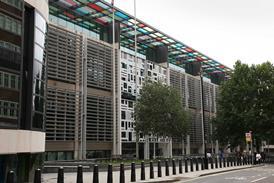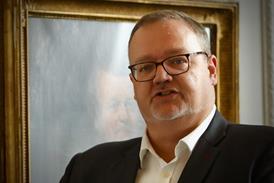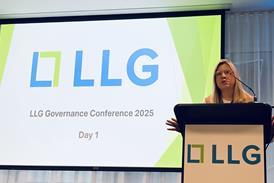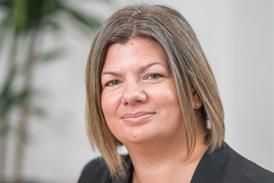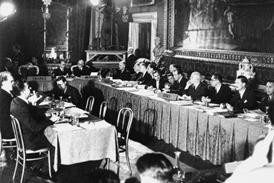A solicitor and former registrar to the Diocese of Gloucester has agreed to remove his name from the roll after he represented the then-bishop of Gloucester against indecent assault allegations.
Christopher Peak can never apply to be readmitted to the roll after his role in helping the former Anglican bishop Peter Ball fight allegations of sexual abuse while also acting as register for the diocese.
Peak was the registrar to the Diocese of Gloucester between January 1985 and November 2012. As part of that role, he was required to be the legal adviser of both the Bishop of Gloucester and the diocese.
In 1992, Ball, then bishop of Gloucester, was arrested and charged with sexual abuse. Ball asked Peak to act for him in a personal capacity and Peak agreed.
The SRA investigation found: ‘Under that retainer, [Peak] was obliged to advise Mr Ball in respect of potential criminal allegations and act in his best interests. This put Mr Peak in conflict with his duties towards the diocese, which were broadly to protect its interests and that of its congregation.
‘If the allegations against Mr Ball were true then he presented a real risk to the congregation and it was in the diocese’s best interests for him to be removed from the church altogether, whereas it was in Mr Ball’s best interests to receive as lenient an outcome as possible and return to his ministry.’
Peak accepted that he explained the definitions of indecent assault and gross indecency to Ball when he advised him and Ball confirmed he had committed those offences.
In February 1993, Peak wrote to the CPS about Ball’s case. He said Ball had signed a deal in escrow which confirmed he would resign his post as bishop and that this would be put into effect if Ball was cautioned.
Ball was cautioned the following month and announced his resignation the same day.
The SRA added: ‘No disciplinary action was taken by the church and Mr Ball was not placed on the church’s list of clergy about whom there were concerns (the effect of which would have been to curtail his future ministry within the church). As a result of campaigning by Mr Ball and his brother, Mr Ball was gradually allowed to carry out services within the church in his capacity as a retired bishop. This included working with children and young men.’
Years later, in 2012, the Archbishop of Canterbury recalled all information about Ball so it could be reviewed centrally. Reports were found referring to Ball’s abuse of boys and young men.
A police investigation was launched as a result of the new evidence uncovered by the review and Ball was arrested in November 2012. Concerns over his age - the former bishop was then 80 - and his health meant Ball was de-arrested but the publicity encouraged other victims to come forward.
Ball used a variety of legal challenges to delay his trial until late 2015. He eventually admitted to misconduct in public office and two indecent assault charges against a number of teenagers and young men. He was sentenced to 32 months in prison and released on licence in February 2017 after serving 16 months. He died in June 2019 aged 87.
Peak admitted that in being the registrar for the diocese and agreeing to represent Ball in a personal capacity, he acted where there was a ‘conflict or significant risk of a conflict between the interests of those two clients.’
The SRA’s mitigating circumstances included that there was no evidence Peak deliberately broke the rules; the conduct took place in 1992 and there had been no other reports or complaints about Peak’s conduct; Peak is now retired and the risk of repeat misconduct was deemed low.
The regulatory body added: 'Although Mr Ball had resigned as bishop, he was gradually allowed an increasingly prominent role in the church which eventually included school visits. It appears that there was at least one further victim after Mr Ball was cautioned, which indicates that he still presented a risk to parishioners. The victims who had complained to the church or police before the caution had to wait years to see any real justice, which will have caused significant emotional distress. The original complainant committed suicide upon learning that the case had been reopened. Actual harm was therefore caused to parishioners as a result of the failure of the Church to take effective action against Mr Ball, which is partly attributable to Mr Peak’s inability to advise them to do so because of his conflict of interests.'
Independent reviews commissioned to investigate why Ball was not convicted sooner discuss Peak’s involvement in ‘some detail’ including ‘pressing’ the CPS for a caution when the allegations were first investigated.
The SRA said: ‘This will have had a significant detrimental impact on the standing of the profession. Mr Peak had direct control and responsibility for his own behaviour. It was his choice to agree to act for Mr Ball in a personal capacity in his criminal case, where the conflict (or risk of conflict) should have been apparent to him.’
The factors of Peak’s case would normally warrant a referral to the Solicitors Disciplinary Tribunal, the SRA said, but it considered this unnecessary, disproportionate and not in the public interest.
As well as voluntarily removing himself from the roll, Peak can never apply for readmission, and cannot be employed or paid by a solicitor in connection with a solicitor’s practice unless prior approval from the SRA has been given. He must also pay SRA investigation costs of £1,350.
The National Secular Society, which had brought a complaint against Peak to the SRA, welcomed the decision. Society president Keith Porteous Wood said: 'The clear conflict of interest led to an unacceptable delay in Ball's conviction, putting children at risk and adding to the anguish of his victims. Peak should never have put the bishop's interests above justice for the victims and the safety of his congregation.'

